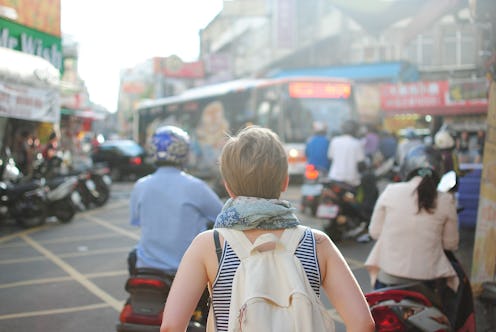Life
7 Ways Living In A Big City Affects Your Health

"This city is killing me." It doesn't matter what city you live in, if you live in a city, you've probably said that before. I often wonder what keeps me in New York City. Growing up in the suburbs, about an hour north of Manhattan, I felt stifled. The living was too easy. I yearned for crowds. I loved attention, I loved noise, and I loved the buzz of opportunity that sounds in every big city.
But once I got here, I was completely overwhelmed but the apparent constant state of chaos the city exists in. There's always a fire, always an arrest, always an accident. People shout into their phones to be heard over the sounds of people shouting on the streets. Cars and trucks drag their weight over potholes and cracks in the road. It's always loud. The subways are either full or late. The food is either dirty or expensive. The crowds are either excited or angry. The people on the streets are mostly indifferent or ambivalent.
Just one day in the city will likely cycle through anger, disappointment, anxiety, stress, frustration, and mania. You go through so much in one day that by the time it's time to tell someone you love how your day was over dinner, you can't remember half of the things you did. There's no 'off' button for the city. You can buy blackout curtains. You can buy a noise-canceling machine. But you can't hide from the city when you're in the city. The city doesn't just change your perspective, but it affects your health, too. Here are seven ways the city endangers your well-being.
Infectious Disease
Remember that fun Ebola scare we had? Yes, living in any city increases your risk of being subjected to a infectious disease. It's just math. More people, more interaction, less control over the spread of infectious disease. Hand sanitizer helps but nothing is 100 percent foolproof.
Attention
Noise pollution can compromise attention span in children and adults. That honking and those sirens are just annoying, they can become really problematic when you're trying to focus. There's a reason why people go away to retreats in the mountains when they want to get work done: peace and quiet.
Allergies
Because cities can be so dirty, we're exposed to a lot of antibacterials and sanitizers from a young age. The attempts to keep kids away from disease can actually blunt their immune system, making them more susceptible to intolerances and allergies.
Asthma
If you live in a city, you know how much "bad air" you breathe in. Sometimes it's obvious — it's smokey, it's burning, it stinks. Other times it's less obvious, or you just get used to it, but that doesn't negate the effect it has on your wellbeing. In a city, you're exposed to so many airborne irritants that can be harsh or damaging on the lungs.
Anxiety
For some, the hustle and bustle of a big city is invigorating. For others, it completely challenges their mental health. The congestion, the noise, the smells, the financial stresses, the interactions, can all contribute to the development and exacerbation of anxiety. Twenty-one percent of city folk are at risk of anxiety. The chaos of the city triggers all sorts of notifiers in the brain, keeping us in a nearly constant state of fight or flight.
Mood Disorders
Just because you're living a big city doesn't mean you don't feel lonely. People move to cities with all sorts of expectations, they want to be around more people or they want to be more independent. But just because you're surrounded with people, doesn't mean you feel connected. It can be incredibly isolating to be among millions of people. There's a 39 percent increased risk of mood disorders for people who live in cities. Not to mention, the risk for developing schizophrenia is doubled for people who are born and raised in a city.
Insomnia
All the noise, all the stress, all the interactions, all the hard work, lead to a hard time getting to sleep. The more stimulated you are during your waking hours, the more difficult it is to shut down that machine of a brain at night. City people have the hardest time falling asleep at night — their brains spin around like carnival rides when they need sleep the most. Hey New Yorkers, there's a reason they call it the city that never sleeps.